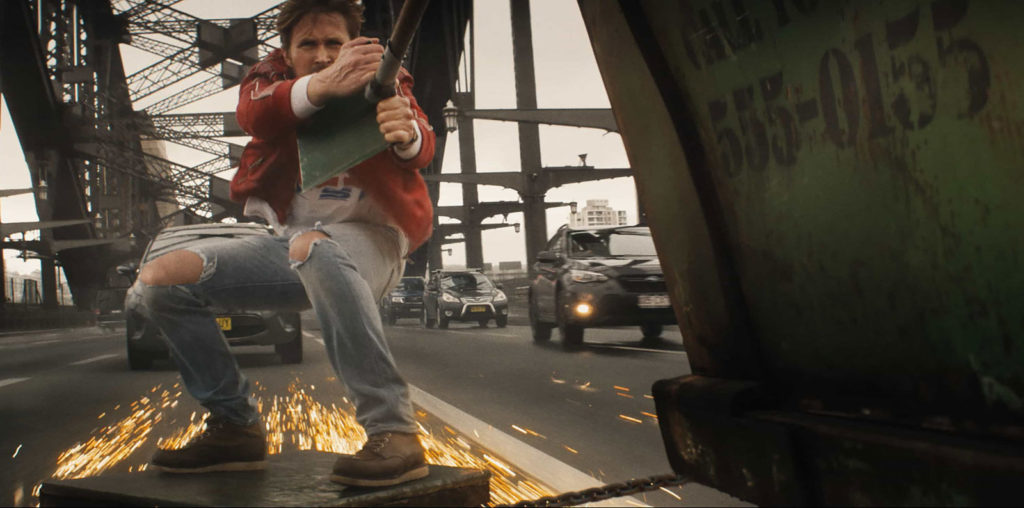
“After Freedom” has the right idea in showing the struggles of a father and son, still trying to make it in America, even after having arrived here so long ago. Based on Vahe Babaian’s own experiences in getting to the United States and subsequently trying to make something of himself, the film’s main focus is Michael Abcarian (Mic Tomasi), who realizes the sacrifices his father, Leon (Greg Satamian), made in getting his family to the United States. Leon was a freight boss for British Airways, in Basrah, Iraq as indicated on his I.D. card at the beginning, which combines still photographs and narration to help us understand where Michael comes from. Leon’s only connection to America was through the in-flight magazines of the airline and the people that would arrive on the weekly flight to the country, a flight that Michael would have the chance to see every week.
In 1954, Leon was sent to Chicago for further training and that was it. When he came back, he did everything humanly possible to get his family to America and sacrificed so much because in America, like many other immigrants, he doesn’t have the job he had over there. In clips, we see him trying to lift a TV on to a cart and sweep hair off the floor of a barber shop. Michael wonders about his own life, feeling that he has an obligation to take care of his father and also whether he should be doing more since his father did so much for him and the rest of the family. Michael works as a manager in a supermarket in Glendale, California (where the entire movie takes place), and wants to climb up further on the food business ladder, but is hindered by Dennis, who seems as if he doesn’t want to recommend Michael for a position that recently opened up, reminding him about the robbery that took place on his shift, even though Michael maintains that it wasn’t his fault.
What motivates Michael to take care of his father is the fact that his mother died a year ago and his father still mourns, going to the cemetery every week to visit her. But Leon sees that his son is trying for something better and doesn’t want to seem like such a burden to him, even if it means learning how to drive, even on the freeway, which Leon is not fond of.
It would have been best if the entire story revolved around Michael, Leon, and Michael’s girlfriend, Ana (Sophie Chahinian), who wants to get married already and is growing wary of Michael’s excuses. Instead, there’s also Michael’s friends, like Avo (Shant Benjanian), a tough-talking take-no-s**t-from-anyone hustler who dabbles in a number of businesses, including gas. Michael is close to Avo because he helped Michael understand America when he had no clue what it was all about. There’s also Mato (Ioannis Bogris), who desperately wants to bring his brother to the United States, even though his father, a janitor, doesn’t see any reason in it since his brother refused to go many years ago.
Avo is such a one-note character, the typical hustler who’s just there for that purpose. Armed with a steeled attitude against anyone that might give him trouble, he’s ready to bring out the a*s-whooping special of the day. That’s all there seems to be with him, with nothing to develop him further. He can be amusingly vulgar at times, but it feels as if he’s from another film, not suited for this one.
Babaian displays a few hiccups with his direction, mainly in editing, with noticeable jump-cuts in the scene between Michael and Ana at the beach. One second they are walking together on the beach and in the next, Ana’s hugging him, without any connecting movement. Problems also stem from the story that’s discussed among the group of friends at a bar, about why nobody should be quick to call someone else a w***e. The story goes that a father got wind of his daughter being called just that and decides to whip out his own brand of vengeance. So he gathers his family together to go to the guy’s house and at first, he’s holding a gun, but after objections that it wasn’t the right weapon, he’s holding a blunt knife. It’s an amusing sight gag, but more trust should have been placed in the actors to tell the story, rather than relying on visual accompaniment. However, one of Vahe Babaian’s strengths is in his ability to absorb everything about a location. He’s a director that appreciates the little things, as evidenced in his close-up shots of items around a location, before focusing on the characters. This makes Glendale feel like the real place that it is, thanks to his and DP Gary Meek’s efforts.
Ana, Michael’s girlfriend, is such a great character. She’s full of support and love for Michael and has much appreciation for his father. She represents perfectly what Michael should be focusing on, and Michael’s father realizes that too through her kindness toward him. Sophie Chahinian perfectly realizes the character and fits flawlessly with Mic Tomasi. This is the reason Michael, Leon, and Ana should have had more screen time because the love between all three characters is entirely palpable. Michael’s sister, Nora (Anahid Shahrik) visits both him and his father, but it feels more like an obligatory appearance, with no other purpose than to question Michael on his life’s goals.
“After Freedom”, despite burgeoning strengths, has too much dead weight littered around with it with characters that don’t feel like they’re in the same film as Michael, Ana, and Leon. It’s a decent effort by director Babaian to tell a story about the struggles father and son face in the same country, but could stand some improvement when it comes to characterizations.
